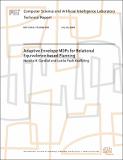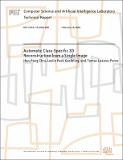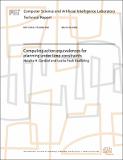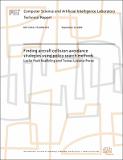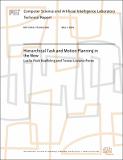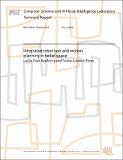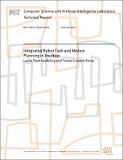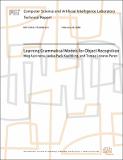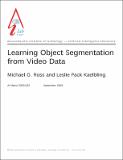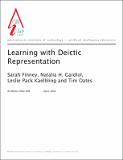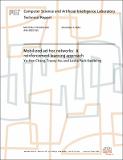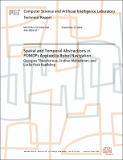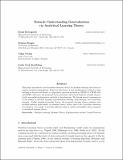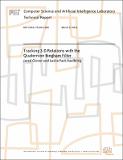Browsing Computer Science and Artificial Intelligence Lab (CSAIL) by Author "Kaelbling, Leslie Pack"
Now showing items 1-18 of 18
-
Adaptive Envelope MDPs for Relational Equivalence-based Planning
Gardiol, Natalia H.; Kaelbling, Leslie Pack (2008-07-29)We describe a method to use structured representations of the environment’s dynamics to constrain and speed up the planning process. Given a problem domain described in a probabilistic logical description language, we ... -
Automatic Class-Specific 3D Reconstruction from a Single Image
Lozano-Perez, Tomas; Kaelbling, Leslie Pack; Chiu, Han-Pang (2009-02-18)Our goal is to automatically reconstruct 3D objects from a single image, by using prior 3D shape models of classes. The shape models, defined as a collection of oriented primitive shapes centered at fixed 3D positions, can ... -
Combining dynamic abstractions in large MDPs
Steinkraus, Kurt; Kaelbling, Leslie Pack (2004-10-21)One of the reasons that it is difficult to plan and act in real-worlddomains is that they are very large. Existing research generallydeals with the large domain size using a static representation andexploiting a single ... -
Computing action equivalences for planning under time-constraints
Gardiol, Natalia H.; Kaelbling, Leslie Pack (2006-03-20)In order for autonomous artificial decision-makers to solverealistic tasks, they need to deal with the dual problems of searching throughlarge state and action spaces under time pressure.We study the problem of planning ... -
Finding aircraft collision-avoidance strategies using policy search methods
Kaelbling, Leslie Pack; Lozano-Perez, Tomas (2009-09-12)A progress report describing the application of policy gradient and policy search by dynamic programming methods to an aircraft collision avoidance problem inspired by the requirements of next-generation TCAS. -
Generalization in Deep Learning
Kawaguchi, Kenji; Kaelbling, Leslie Pack; Bengio, Yoshua (2018-05-01)With a direct analysis of neural networks, this paper presents a mathematically tight generalization theory to partially address an open problem regarding the generalization of deep learning. Unlike previous bound-based ... -
Hierarchical Task and Motion Planning in the Now
Kaelbling, Leslie Pack; Lozano-Perez, Tomas (2010-05-07)In this paper we outline an approach to the integration of task planning and motion planning that has the following key properties: It is aggressively hierarchical. It makes choices and commits to them in a top-down fashion ... -
Integrated robot task and motion planning in belief space
Kaelbling, Leslie Pack; Lozano-Perez, Tomas (2012-07-03)In this paper, we describe an integrated strategy for planning, perception, state-estimation and action in complex mobile manipulation domains. The strategy is based on planning in the belief space of probability distribution ... -
Integrated Robot Task and Motion Planning in the Now
Kaelbling, Leslie Pack; Lozano-Perez, Tomas (2012-06-29)This paper provides an approach to integrating geometric motion planning with logical task planning for long-horizon tasks in domains with many objects. We propose a tight integration between the logical and geometric ... -
Learning Grammatical Models for Object Recognition
Aycinena, Meg; Kaelbling, Leslie Pack; Lozano-Perez, Tomas (2008-02-25)Many object recognition systems are limited by their inability to share common parts or structure among related object classes. This capability is desirable because it allows information about parts and relationships in ... -
Learning object segmentation from video data
Ross, Michael G.; Kaelbling, Leslie Pack (2003-09-08)This memo describes the initial results of a project to create a self-supervised algorithm for learning object segmentation from video data. Developmental psychology and computational experience have demonstrated that the ... -
Learning object segmentation from video data
Ross, Michael G.; Kaelbling, Leslie Pack (2003-09-08)This memo describes the initial results of a project to create aself-supervised algorithm for learning object segmentation from videodata. Developmental psychology and computational experience havedemonstrated that the ... -
Learning with Deictic Representation
Finney, Sarah; Gardiol, Natalia H.; Kaelbling, Leslie Pack; Oates, Tim (2002-04-10)Most reinforcement learning methods operate on propositional representations of the world state. Such representations are often intractably large and generalize poorly. Using a deictic representation is believed to be ... -
Mobilized ad-hoc networks: A reinforcement learning approach
Chang, Yu-Han; Ho, Tracey; Kaelbling, Leslie Pack (2003-12-04)Research in mobile ad-hoc networks has focused on situations in whichnodes have no control over their movements. We investigate animportant but overlooked domain in which nodes do have controlover their movements. ... -
Mobilized ad-hoc networks: A reinforcement learning approach
Chang, Yu-Han; Ho, Tracey; Kaelbling, Leslie Pack (2003-12-04)Research in mobile ad-hoc networks has focused on situations in which nodes have no control over their movements. We investigate an important but overlooked domain in which nodes do have control over their movements. ... -
Spatial and Temporal Abstractions in POMDPs Applied to Robot Navigation
Theocharous, Georgios; Mahadevan, Sridhar; Kaelbling, Leslie Pack (2005-09-27)Partially observable Markov decision processes (POMDPs) are a well studied paradigm for programming autonomous robots, where the robot sequentially chooses actions to achieve long term goals efficiently. Unfortunately, ... -
Towards Understanding Generalization via Analytical Learning Theory
Kawaguchi, Kenji; Benigo, Yoshua; Verma, Vikas; Kaelbling, Leslie Pack (2018-10-01)This paper introduces a novel measure-theoretic theory for machine learning that does not require statistical assumptions. Based on this theory, a new regularization method in deep learning is derived and shown to ... -
Tracking 3-D Rotations with the Quaternion Bingham Filter
Glover, Jared; Kaelbling, Leslie Pack (2013-03-27)A deterministic method for sequential estimation of 3-D rotations is presented. The Bingham distribution is used to represent uncertainty directly on the unit quaternion hypersphere. Quaternions avoid the degeneracies of ...

